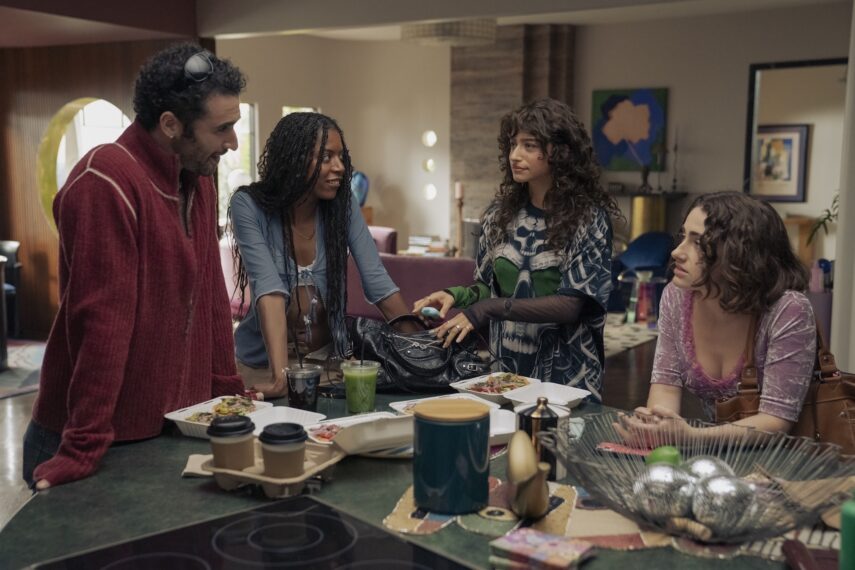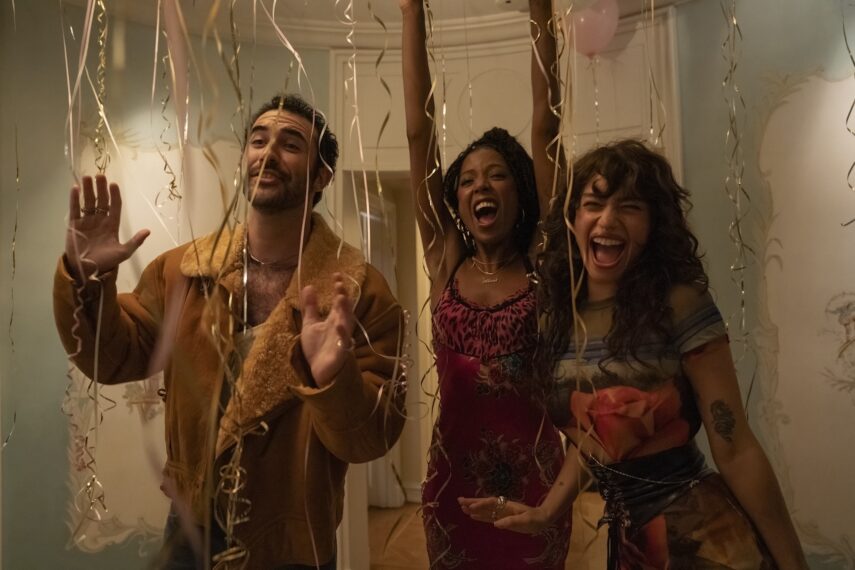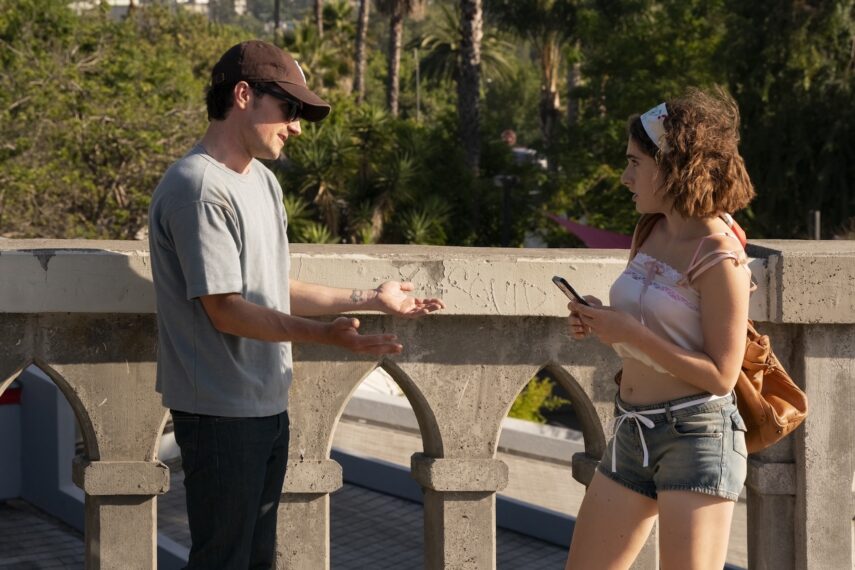Twenty-seven-year-old Maia (Rachel Sennott) almost has it all: a great boyfriend, Dylan (Josh Hutcherson), friends she loves, and a promising social media job — if only her elder-millennial boss (Leighton Meester) would let her climb the company ladder. In part inspired by her life, Sennott created I Love LA “with this strong POV that her generation doesn’t get to just wait in line and take anything for granted,” executive producer Emma Barrie (Barry) explains. It’s a story about 20-somethings who were “thrown into the real world post-COVID” and who feel “a rush to catch up and find success while it feels like there’s a ticking clock.”
Premiering on Sunday, November 2, on HBO, the comedy shows the lack of stability that Millennials and Gen-Z face in the workplace, which, because of the internet and COVID, is unique to their generations. It’s also one of the more realistic and sympathetic depictions of social media careers — for influencers and managers alike (no, they’re not just interns) — and strikes a good balance of making fun of the industry’s more ridiculous realities and taking the hardships of it seriously.
On top of that, it’s a story about the pivotal final three years of your 20s, which astrology calls the “Saturn Return,” when you truly reach adulthood. Like Insecure before it, the series kicks off on the main character’s birthday, when Maia’s forced to take stock of her life. Her day is thrown off kilter when her complicated best friend, influencer Tallulah (Odessa A’zion), arrives as an unwelcome surprise. Maia has distanced herself from Tallulah after she flaked on their plan to move to LA together, among other issues. Now, Maia is questioning whether the most significant friendship of her early 20s should be left in that decade.
The series also stars Jordan Firstman as Charlie, a celebrity stylist, and True Whitaker as Alani, a Hollywood nepo baby (the actor knows the nepo baby tropes firsthand — her father is Forest Whitaker). Guest stars include Meester, Moses Ingram, Lauren Holt, Elijah Wood, Quenlin Blackwell, Josh Brener, Tim Baltz, Froy Gutierrez, and Colin Woodell.
Here, Barrie tells us what to expect in the late-20s coming-of-age story.
What is the origin story for the show’s premise?
Emma Barrie: Rachel had just gone through her own Saturn Return, and wanted to write something that spoke to that specific time period — not your early 20s where you’re trying to figure it out, but your late 20s, where you’re forced to make big decisions that could potentially impact the rest of your life — do I marry the guy or break up with him? Do I continue on this steady career path, or step into the unknown? It’s about Rachel’s experience being thrown into the real world, post-COVID, feeling in a rush to catch up and find success, while it feels like there’s a ticking clock.

Kenny Laubbacher / HBO
Did you pull from real-life experiences from the cast and creators? What else inspired your storylines?
The best comedy starts with something true, and a lot of the storylines are things that happened to Rachel, one of the writers, or a cast member. There are parts of each of us in every character, so sometimes you tell a story, and you’re like, yup, that’s Alani. And Rachel lives such an insane, hilarious life that we never had a shortage of stories. We’d start our day in the writers’ room, talking about how our nights were, and I’d share that I tried a new brand of spaghetti sauce, and Rachel would have a story about how she went to a Disney Channel star’s house and accidentally flushed an Oscar down the toilet or something.
The title is tongue-in-cheek. Maia loves her life in LA, but it’s also exhausting trying to “make it” there. How is that feeling part of the show’s DNA?
Maia’s highs and lows are deeply tied to her career — a reflection of life in LA, where the industry is always shifting. The highs are exhilarating, the lows are crushing, and stability is rare. It has stunning natural beauty, and you get to see movie stars at CVS, but also sometimes it catches on fire. For Maia, work isn’t just work; it’s the center of her identity.
She believes that if you don’t prioritize ambition and success, you risk missing your chance. She wants a big life, and she knows that comes with sacrifices. Rachel came in with this strong POV that her generation doesn’t get to just wait in line and take anything for granted, that you have to fight for your spot tooth and nail, and LA is a beautiful place for that combat to happen.

Kenny Laubbacher / HBO
The series is a more realistic depiction of internet/social media culture. How will the characters be relatable to multiple generations of viewers?
Struggling to figure out your career and relationship in your late 20s is a pretty universal experience, as is rekindling an old, complicated friendship. The internet is just a vehicle to tell our characters’ stories and contextualize it in 2025. But relying on those you love to navigate a big, scary city is forever! Also, my dad is 79 years old and laughed out loud [while] watching.
Tell me how Rachel, Josh, Jordan, True, and Odessa are uniquely suited to bring these characters to life. How would you describe their group chemistry?
Jordan and Rachel are best friends in real life, so that felt like a shortcut. There was already such chemistry between them. And then the second Odessa walked in, we were all like, “Yup, that’s Tallulah.” She’s so charming and charismatic and immediately had a hold on us. We needed the audience to understand why the internet loves Tallulah without showing too much of her online presence, and with Odessa, we knew it would be clear.
After we met with True, we re-wrote the character of Alani. She was so uniquely funny and sweet, we fell in love with her cadence and quirks. And then Josh fit in seamlessly. We needed someone who would jell easily with the rest of the cast — be the boyfriend everyone loves — but you could also believe he’s somewhat of an outsider when it comes to the influencer world and celebrity. Dylan is a middle school teacher who uses an Android. He has different priorities, but never looks down on Maia or her friends, and Josh plays that beautifully.

Kenny Laubbacher / HBO
You worked on Barry, which had both critique and reverence for Hollywood. How does I Love LA do that with the social media industry?
I’d argue Hollywood and the social media industry aren’t really that distinct anymore. Actors are social media stars and vice versa. Rachel’s deeply fluent in online culture. She understands the logic of micro-trends and viral sounds, the way someone’s tiny online beef can spiral into a full-blown cultural moment. She’s dealt firsthand with being memed (Fatima!), going viral, and being sh*t-talked on Reddit. We try to juxtapose the seemingly effortless casualness that influencers often project with the intense dedication and work it takes to sustain an online presence, especially in a world where time and attention are the most valuable commodities.
You have a surprise cameo in the first episodes. Can viewers expect more surprise guest stars throughout the season?
Yes! This is a show about best friends having each other’s backs as they navigate a city full of maniacs. We absolutely have more surprises in store.
What can you share about Moses Ingram, Elijah Wood, and Tim Baltz’s characters?
I’m allowed to share almost nothing. Moses wore her own glasses in one of the episodes, and we all asked where they were from because they were so cute. Tim Baltz can do an incredible Parisian accent. Does he do one in the show? You’ll have to tune in to find out.
I Love LA, Series Premiere, Sunday, November 2, 10:30/9:30c, HBO
